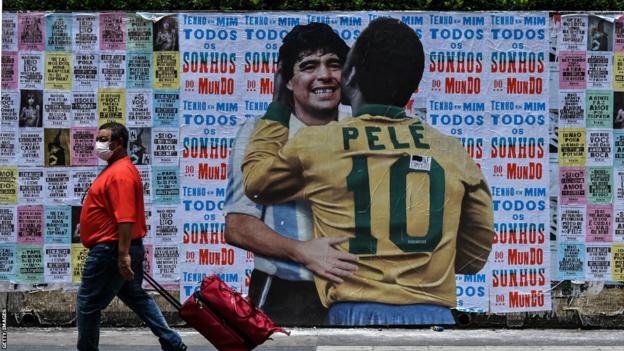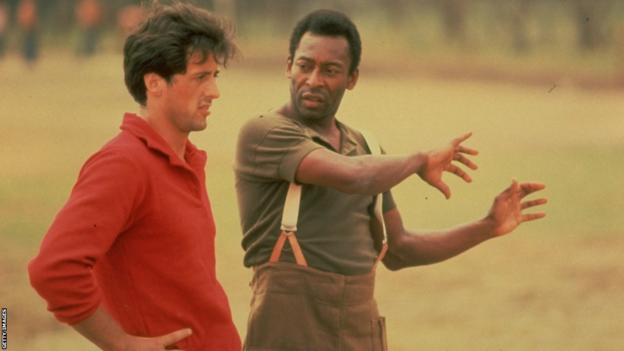Pele: My memories of meeting a football legend
Last updated on 29 December 202229 December 2022.From the section Football
The last time I saw Pele in person he was behind the counter of a Subway branch in Central London, struggling to fit the salad fillings into a sandwich.
It was March 2015, and no, the Brazilian football legend had not fallen on hard times – it was a publicity stunt courtesy of the US fast food company, with whom the man known as King Pele to his fellow countrymen had one of his many post-career endorsement deals.
By then Pele and I had already met a bunch of times, which was enough to trigger a wide smile when he clocked me among the scrum of journalists. I was fortunate enough to secure a one-to-one interview, but my happiest memory of that afternoon was that Pele looked fit and healthy at the age of 74.
“You had everyone worried with that hospital business, King,” I told him.
“Did you forget I was born in the town of Tres Coracoes (Three Hearts in Portuguese)? It’s difficult to put someone who has ‘three hearts’ in the ground,” he answered, with a laugh.
‘Like meeting one of the Avengers’
A year earlier, he had looked so frail during his appearance at football governing body Fifa’s awards ceremony in Zurich that, like many other Brazilian journalists, I was genuinely worried he wasn’t going to be around for much longer.
As it turned out, Pele was already battling kidney problems, which were aggravated by the fact he had actually lost a kidney in the 1970s, damaged by the battering dispensed by opponents throughout his 21-year professional career.
Every time that our paths crossed, I would spend the following days wondering what had just happened. It was like being in the presence of one of the Avengers – one who always seemed happy to see you.
For many football fans, and Brazilians especially, the man born as Edson Arantes do Nascimento was superhuman – simply the greatest player to have ever kicked a ball.
Just like John Lennon once said that ‘rock and roll’ should have been called ‘Chuck Berry’ for his influence on the musical genre, football should have been dubbed ‘Pele’.
He is still the only person to have won three Fifa World Cups as a player and he was only 17 when Brazil first lifted the trophy in 1958.
Twelve years later, he was part of a Brazil side that won the title in Mexico with such flair that it still wins polls for the best team ever assembled.
One of the best compliments to Pele’s performance in that tournament came from Italy’s Tarcisio Burgnich, the defender charged with man-marking the Brazilian in the final.
“I told myself before the game, ‘he’s made of skin and bones, just like everyone else’. But I was wrong.”
Pele scored one and set up two more in that game, as Brazil won their – and his – third World Cup. That goal was one of more than 1,200 that he would score in his career.
Unlikely national treasure
Pele left an impression that transcended the game and led Andy Warhol, the late US artist, to amend his famous quote about the transient nature of fame.
“Pele was one of the few who contradicted my theory: instead of 15 minutes of fame, he will have 15 centuries,” Warhol predicted.
Pele the player had already retired from international duty before I was born in 1973, but growing up in Brazil made it impossible to escape hearing over and over again tales of his feats.
But in addition to helping Brazil become the world’s most successful footballing country, Pele, a black man, did something even more significant: he rose to the status of national treasure in a land with a shameful past of slavery and a legacy of segregation that persists to these days.
He was and still is the most famous Brazilian. Everywhere I have travelled – from New York to sub-Saharan Africa – his is the first name anyone mentions after I tell them where I am from.

Pele, of course, also had his critics. There were those who thought he should have spoken out against the military regime that ruled Brazil with an iron fist between 1964 and 1985 and whose leaders were not shy of piggybacking on the success of the national team.
Pele wasn’t the only one his peers who appeared to have turned a blind eye to the repression, but none of them had his charisma.
In a 2021 Netflix documentary, Pele said, in an apologetic tone, that “footballers wouldn’t have made a difference” to the human rights violations that took place during the years of military rule.
“If I said I didn’t know about [the violations], I’d be lying. But we weren’t sure of what was happening.”
In later years, Pele would claim that he refused to come back from international retirement to play the 1974 World Cup in protest against the military.
Punditry, politics and endorsements

Neither did Pele actively engage with more formal efforts against racism in Brazil, whether in his playing days or after retiring.
In 2014, he was heavily criticised after appearing to normalise a racist incident in a Brazilian Championship game by saying that he had suffered enough racial abuse in his playing days to “stop every game I have ever taken part in”.
Pele’s personal life was also marked by controversy – the arrest of his son, Edson, for involvement in drug trafficking, and his refusal to acknowledge Sandra, a daughter born after an affair in the early 1960s.
In the Netflix documentary, Pele admitted having “so many affairs that he didn’t know how many kids I had”.
Pele hung his boots up for good in 1977 after a stint in the US’ ill-fated first professional football league.
He never went into management and his involvement with the game was largely limited to stints in TV punditry – the scenes of him jumping up and down still wearing his headset in the press box of the Rose Bowl stadium in Los Angeles when Brazil won the 1994 Men’s World Cup still bring a tear to my eyes.
He would also appear in soap operas and movies like Escape to Victory and even served as Brazil’s Minister for Sport between 1995-98.
Pele endorsed a myriad of national and international companies, which sometimes led to mockery, like when we advertised medicine for erectile dysfunction in the 2000s – although in hindsight it was perhaps a brave move.
Pele was a go-to source for quotes for national and international media – he never really measured his words much, even if it meant upsetting famous colleagues.
Brazil’s World Cup winning forward Romario once said that “Pele is a poet with his mouth shut”.
He also could make way off mark predictions.
It was Pele who predicted in the 1970s that an African team “would win the World Cup before the 21st Century”.
He also famously tipped Colombia to win the 1994 World Cup after the South American nation spectacularly demolished Argentina to qualify for the tournament – they were knocked out in the first round after losing to the US.
‘My history in the game gives me a right to speak my mind’
But he rolled with the punches.
“I think my history in the game gives me a right to speak my mind,” he told me in Berlin in 2006, in another surreal moment in which I found myself in a luxury hotel suite with him and his staff watching England’s World Cup round of 16 match against Ecuador.
That afternoon, he launched into a full-blown rant against everything and everyone who, in his opinion, was unfairly criticising him – including a certain Diego Maradona. It was pure gold for a bombastic article, but unfortunately one that would never see the light of day – the King had already made it clear: “You are here as a friend, not as a journalist”.
Who was I to go against royalty? But when Brazil got knocked out by France in the quarter-finals of that tournament, Pele’s only newspaper interview reacting to the result was given to me.
Since the incredible arrival of Lionel Messi on the scene, many have been tempted to claim Pele had been toppled as the world’s best ever footballer. Not in the Brazilian legend’s opinion.
“I could score headers and kick with both feet, while Messi tends to use his left much more. He also needs to score a thousand goals,” Pele told me in London.
I wish I had the chance to tell Pele one more time in person that the Argentine was also still lacking three World Cup trophies.
That used to make the King laugh. And I will miss that laughter dearly.

